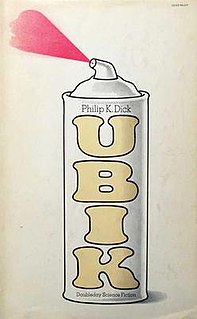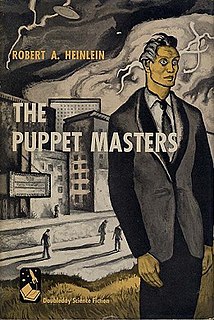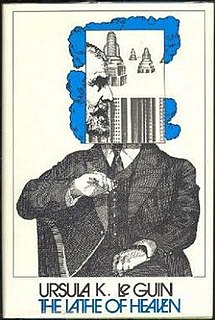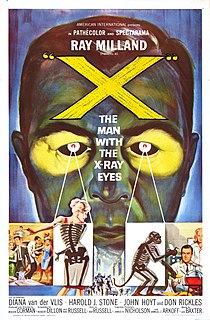
Alfred Elton van Vogt was a Canadian-born science fiction author. His fragmented, bizarre narrative style influenced later science fiction writers, notably Philip K. Dick. He was one of the most popular and influential practitioners of science fiction in the mid-twentieth century, the genre's so-called Golden Age, and one of the most complex. The Science Fiction Writers of America named him their 14th Grand Master in 1995.

Alternate history is a genre of speculative fiction of stories in which one or more historical events occur and are resolved differently than they were in real life. As conjecture based upon historical fact, alternative history stories propose What if? scenarios about crucial events in human history, and present outcomes very different from the historical record. Alternate history also is a subgenre of literary fiction, science fiction, and historical fiction; as literature, alternate history uses the tropes of the genre to answer the What if? speculations of the story.

Ubik is a 1969 science fiction novel by American writer Philip K. Dick. The story is set in a future 1992 where psychic powers are utilized in corporate espionage, while cryonic technology allows recently deceased people to be maintained in a lengthy state of hibernation. It follows Joe Chip, a technician at a psychic agency who, after an assassination attempt, begins to experience strange alterations in reality that can be temporarily reversed by a mysterious store-bought substance called Ubik.

Robert Anson Heinlein was an American science fiction author, aeronautical engineer, and naval officer. Sometimes called the "dean of science fiction writers", he was among the first to emphasize scientific accuracy in his fiction, and was thus a pioneer of the subgenre of hard science fiction. His published works, both fiction and non-fiction, express admiration for competence and emphasize the value of critical thinking. His plots often posed provocative situations which challenged conventional social mores. His work continues to have an influence on the science-fiction genre, and on modern culture more generally.

Science fiction fandom or SF fandom is a community or fandom of people interested in science fiction in contact with one another based upon that interest. SF fandom has a life of its own, but not much in the way of formal organization.

The Puppet Masters is a 1951 science fiction novel by American writer Robert A. Heinlein, in which American secret agents battle parasitic invaders from outer space. It was originally serialized in Galaxy Science Fiction.

Bored of the Rings is a 1969 parody of J. R. R. Tolkien's The Lord of the Rings. This short novel was written by Henry Beard and Douglas Kenney, who later founded National Lampoon. It was published in 1969 by Signet for the Harvard Lampoon, and, unusually for a parody, has remained in print for over 40 years. It has been translated into at least eleven languages.

A novella is a narrative prose fiction whose length is shorter than most novels, but longer than most short stories. The English word novella derives from the Italian novella meaning a short story related to true facts.

Galaxy Science Fiction was an American digest-size science fiction magazine, published in Boston from 1950 to 1980. It was founded by a French-Italian company, World Editions, which was looking to break into the American market. World Editions hired as editor H. L. Gold, who rapidly made Galaxy the leading science fiction magazine of its time, focusing on stories about social issues rather than technology.

Nilanjana Sudeshna "Jhumpa" Lahiri is an American author known for her short stories, novels and essays in English, and, more recently, in Italian.

Thomas Michael Disch was an American science fiction author and poet. He won the Hugo Award for Best Related Book – previously called "Best Non-Fiction Book" – in 1999, and he had two other Hugo nominations and nine Nebula Award nominations to his credit, plus one win of the John W. Campbell Memorial Award, a Rhysling Award, and two Seiun Awards, among others.

Momo, also known as The Grey Gentlemen or The Men in Grey, is a fantasy novel by Michael Ende, published in 1973. It is about the concept of time and how it is used by humans in modern societies. The full title in German translates to Momo, or the strange story of the time-thieves and the child who brought the stolen time back to the people. The book won the Deutscher Jugendliteraturpreis in 1974.

The Lathe of Heaven is a 1971 science fiction novel by American writer Ursula K. Le Guin. The plot concerns a character whose dreams alter past and present reality. The story was serialized in the American science fiction magazine Amazing Stories. The novel received nominations for the 1972 Hugo and the 1971 Nebula Award, and won the Locus Award for Best Novel in 1972. Two television film adaptations were released: the PBS production, The Lathe of Heaven (1980), and Lathe of Heaven (2002), a remake produced by the A&E Network.

X: The Man with the X-ray Eyes is a 1963 American science fiction horror film, produced and directed by Roger Corman, from a script by Ray Russell and Robert Dillon.

John Michael Scalzi II is an American science fiction author and former president of the Science Fiction and Fantasy Writers of America. He is best known for his Old Man's War series, three novels of which have been nominated for the Hugo Award, and for his blog Whatever, where he has written on a number of topics since 1998. He won the Hugo Award for Best Fan Writer in 2008 based predominantly on that blog, which he has also used for several charity drives. His novel Redshirts won the 2013 Hugo Award for Best Novel. He has written non-fiction books and columns on diverse topics such as finance, video games, films, astronomy, writing and politics, and served as a creative consultant for the TV series Stargate Universe.

Paul Levinson is an American author, singer-songwriter, and professor of communications and media studies at Fordham University in New York City. His novels, short fiction, and non-fiction works have been translated into sixteen languages. He is frequently quoted in news articles and appears as a guest commentator on major news outlets. He is also a songwriter, singer, and record producer.

The Tower of Zanid is a science fiction novel by American writer L. Sprague de Camp, the sixth book of his Viagens Interplanetarias series and the fourth of its subseries of stories set on the fictional planet Krishna. Chronologically it is the seventh Krishna novel. It was first published in the magazine Science Fiction Stories for May 1958. It was first published in book form in hardcover by Avalon Books, also in 1958, and in paperback by Airmont Books in 1963. It has been reissued a number of times since by various publishers. For the later standard edition of Krishna novels it was published together with The Virgin of Zesh in the paperback collection The Virgin of Zesh & The Tower of Zanid by Ace Books in 1983. An E-book edition was published by Gollancz's SF Gateway imprint on September 29, 2011 as part of a general release of de Camp's works in electronic form. The novel has also been translated into Italian and German.

Alojz Rebula was a Slovene writer, playwright, essayist, and translator, and a prominent member of the Slovene minority in Italy. He lived and worked in Villa Opicina in the Province of Trieste, Italy. He was a member of the Slovenian Academy of Sciences and Arts.
Paul van Herck was a Belgian writer of science fiction novels and radio plays.

The Martian is a 2011 science fiction debut novel written by Andy Weir. The book was originally self-published on Weir's blog, in a serialized format. In 2014, the book was re-released after Crown Publishing Group purchased the exclusive publishing rights. The story follows an American astronaut, Mark Watney, as he becomes stranded alone on Mars in 2035 and must improvise in order to survive.



















